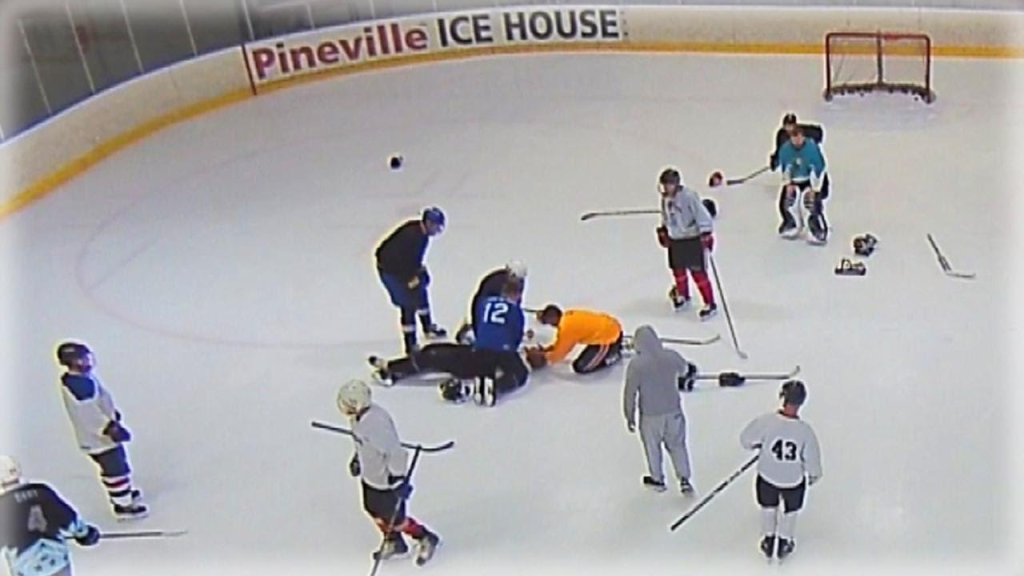As the NHL playoffs intensify, so too does the concern for heart health, particularly among devoted fans who may face a heightened risk of heart attack during these thrilling games. The emotional stress of watching closely contested hockey matches can elevate heart rates and blood pressure, triggering serious cardiac events for those predisposed to heart issues. Experts warn that the combination of extreme excitement and unhealthy habits, such as heavy drinking and poor diet during playoff games, could have detrimental effects on heart health. Studies indicate that not only do sports-related emotional stressors impact fans’ well-being, but they can also lead to severe health risks, including heart attacks. As the excitement builds, it’s crucial for fans to be aware of the potential health effects of the NHL playoffs and prioritize their cardiovascular health.
The heart risks associated with high-stakes sports events, particularly during the NHL postseason, have been a growing concern for many spectators. The psychological strain caused by rooting for one’s favorite hockey team can lead to increased blood pressure and other heart-related complications. With passion and investment in the outcome, fans may unknowingly escalate their heart health risks, especially if they have pre-existing conditions. Such situations prompt discussions about the effects of competitive sports on cardiovascular health and the necessity of monitoring emotional stress during thrilling playoff seasons. As fans engage wholeheartedly with their teams, understanding the balance between excitement and heart safety becomes imperative.
The Heart Health Risks of Emotionally Charged Sports Viewing
Watching emotionally charged sports events, particularly during intense playoff seasons like the NHL playoffs, can lead to significant heart health risks for some fans. The excitement and stress associated with these games can cause spikes in heart rate and blood pressure, which are critical factors for individuals with pre-existing heart conditions. When adrenaline surges from moments of triumph or disappointment, some fans might experience chest pains or other symptoms of stress on the heart, making careful monitoring of their emotional and physical responses vital.
Moreover, the connection between sports stress and heart health isn’t just anecdotal; numerous studies have shown that high-pressure sports events can trigger cardiac events in vulnerable individuals. The emotional investment in teams and the psychological stress that sports fans endure can lead to serious health consequences, especially for those predisposed to heart issues. It is essential for fans to understand their health status and the potential risks involved when supporting their teams during pivotal playoff games.
NHL Playoffs Heart Attack Risk: What Fans Should Know
The NHL playoffs bring a unique thrill that can elevate one’s emotional state, but this excitement comes with a potential health risk. Studies show that during critical sports events, there’s an increase in emergency room visits due to heart-related incidents. The heightened emotional stakes can be especially dangerous for fans with underlying health issues, as the combination of intense emotions and physical responses can lead to a heart attack for those already at risk.
Understanding the NHL playoffs heart attack risk highlights the need for fans to practice moderation during games. Engaging in healthy habits — such as taking breaks during the game, managing stress levels, and avoiding binge eating or drinking — can help mitigate these risks. Fans can still celebrate and cheer on their teams while keeping their heart health in check. By being mindful of their emotional and physical well-being, sports enthusiasts can enjoy the excitement of the playoffs without compromising their health.
How Emotional Stress from Hockey Games Affects the Heart Health of Fans: During the NHL playoffs, the emotional stress fans experience can take a toll on their heart health. The connection between intense emotional responses and cardiac events is corroborated by research, which indicates a rise in hospital visits for heart-related issues during major sports competitions. Fans need to recognize that while they are cheering for their teams, their body may be reacting in ways that could be harmful if they are already at risk for heart disease.
Understanding how emotional stress from hockey games affects the heart can empower fans to make safer choices. For instance, fans can manage their blood pressure and heart health through relaxation techniques such as deep breathing or moderate exercise, even while engaging with their favorite teams. Balancing the thrill of playoff hockey with prudent health management ensures that fans can fully enjoy the game without unnecessary health risks.
Cardiac Events Among Sports Fans: Statistics and Implications
Recent statistics reveal alarming correlations between watching live sports and cardiac events, particularly for fans who become highly invested in their teams’ outcomes. In studies looking at hospital admission rates during critical sports events, a notable spike has been recorded, particularly reflecting increases in heart attacks and other serious cardiovascular incidents. This trend suggests that watching sports, like the NHL playoffs, is more than just a leisure activity; it’s a state that can significantly stress the heart.
The implications of these findings are vast, emphasizing the need for sports fans to be aware of their health. From understanding the dangers of emotional peaks during nail-biting games to recognizing the importance of maintaining a heart-healthy lifestyle, fans are encouraged to keep their health in focus while supporting their teams. Simple precautions, such as moderation in consumption of food and alcohol, can play a crucial role in mitigating the risk of cardiac events while enjoying intense playoff action.
The Role of Emotional Stress in Heart Health During Sports Events
The emotional stress of rooting for a favorite team during high-stakes games can have significant repercussions on heart health. Medical professionals warn that the emotions tied to sports, especially during events like the NHL playoffs, can lead to physical effects such as elevated heart rates and blood pressure. Negative emotional outcomes, such as disappointment after a loss, may even exacerbate cardiovascular problems, especially for fans with prior heart conditions.
Recognizing the role of emotional stress in heart health can empower fans to monitor their reactions during games. By adopting strategies such as mindfulness and stress reduction techniques, fans can enjoy the excitement of hockey playoffs while minimizing potential health risks. It’s crucial for fans to be aware that their emotional engagement in sports can extend beyond mere fandom and affect their overall health.
Managing Heart Health During Exciting Sports Seasons
As the intensity of the NHL playoffs rises, managing heart health becomes crucial, particularly for fans at risk for heart conditions. By making conscious choices about lifestyle and stress management, fans can enhance their ability to cope with the emotional rollercoaster of playoff hockey. Implementing small changes, such as moderating food and drink intake and establishing breaks during high-pressure moments, can significantly protect heart health during this exhilarating time.
Furthermore, educating oneself about heart health and recognizing personal risk factors can empower fans to enjoy the game responsibly. Maintaining regular health check-ups and consulting with healthcare providers can also optimize cardiovascular health, especially before engaging in emotionally charged sporting events. By prioritizing their well-being, fans can cheer passionately for their teams without jeopardizing their heart health.
Understanding Heart Attack Risks in Relation to Sports Fandom
Understanding the heart attack risks associated with sports fandom requires an awareness of how emotional involvement impacts physical health. The fervor and excitement associated with events like the NHL playoffs can lead to distress and physiological changes that stress the cardiovascular system. With studies linking high-stress levels to increased rates of heart attacks, fans should be cognizant of their health profiles when engaging in high-energy sporting events.
This understanding is particularly crucial for individuals with underlying conditions who might assume that the excitement of cheering for their teams poses no risk. Safety measures during game days, such as ensuring a healthy diet, avoiding excessive alcohol consumption, and recognizing early signs of distress, can help prevent adverse health outcomes associated with high-stress sports viewing experiences. Emphasizing heart awareness during emotionally charged games can safeguard the well-being of passionate sports fans.
Healthy Fan Practices During NHL Playoffs
Encouraging healthy fan practices during the NHL playoffs can significantly reduce the risk of heart-related health issues. Fans are advised to prepare for high-stress situations by staying hydrated, eating nutritious snacks, and avoiding excessive drinking or consumption of unhealthy foods. Establishing pre-game and post-game rituals that promote relaxation and cardiovascular health can help balance the intense emotions tied to playoff hockey.
Additionally, incorporating moderate physical activity or relaxation techniques during commercial breaks or halftime can foster both mental and physical wellness. Simple practices such as walking or stretching can alleviate the pent-up tension of watching games while also protecting heart health. Cheer for your team, but do it with an approach that values your well-being.
The Importance of Monitoring Heart Health During Sports Seasons
Monitoring heart health during sports seasons, particularly during high-stakes playoffs like the NHL, is crucial for fans who may be at risk. Engaging in regular health screenings can help individuals stay informed about their blood pressure, cholesterol levels, and other important heart health indicators, which is vital before immersing oneself in emotionally charged games. This proactive approach can help prevent serious cardiac events linked to the stress of sports.
Awareness of personal health metrics and understanding the emotional triggers that come with watching sports can aid fans in managing their health effectively. Fans may consider keeping a diary of their physical responses to games, noting any significant changes in their mood or health. By actively monitoring their heart health during sports seasons, fans can maintain a balance between enjoying the games and safeguarding their well-being.
Frequently Asked Questions
Can the NHL playoffs increase the risk of heart attacks for fans?
Yes, watching the NHL playoffs can potentially increase the risk of heart attacks, particularly for fans who already have underlying heart conditions. The intense emotional stress of playoff hockey can elevate heart rates and blood pressure, leading to cardiac events in susceptible individuals.
How does emotional stress from NHL playoffs affect heart health?
Emotional stress from NHL playoffs can have significant effects on heart health. As fans become intensely invested in the games, their stress levels may rise, which has been linked to serious heart issues such as heart attacks and irregular heartbeats.
What are the health effects of watching NHL playoffs for sports fans?
The health effects of watching NHL playoffs can include increased heart rate and blood pressure due to emotional stress. For fans with existing heart issues, this heightened stress can lead to serious cardiac events, particularly if compounded by unhealthy game day habits.
Is there a link between watching sports games and heart attacks?
Yes, studies indicate a link between watching sports games, including NHL playoffs, and heart attacks. High-stakes matches can lead to intense emotional reactions, increasing cardiovascular stress, particularly in individuals with preexisting heart conditions.
What should fans do to reduce the heart attack risk while watching NHL playoffs?
To reduce heart attack risk while watching NHL playoffs, fans should maintain overall heart health by managing stress, avoiding excessive alcohol consumption, eating healthy snacks, and monitoring their heart health, especially if they have known risk factors.
Can watching intense sports games cause cardiac events?
Yes, watching intense sports games can cause cardiac events, particularly among fans who may be emotionally invested in the games and have underlying heart health issues. Stressful situations during pivotal playoff moments can lead to increased heart strain.
Are certain fans at higher risk for heart attacks during the NHL playoffs?
Yes, fans with preexisting health conditions, such as heart disease, high blood pressure, or high cholesterol, are at higher risk for heart attacks during the NHL playoffs due to the added emotional and physical stress associated with the excitement of the games.
What are common triggers for heart attacks during sports events?
Common triggers for heart attacks during sports events include emotional stress from high-stakes games, unhealthy eating habits, excessive alcohol consumption, and delayed medical treatment, all of which can elevate cardiovascular risk during the NHL playoffs.
| Key Points |
|---|
| NHL playoffs can increase heart attack risk, especially for fans with existing heart conditions. |
| Excitement can raise heart rate and blood pressure, creating risks for unhealthy individuals. |
| Heart disease is the leading cause of death in Canada, exacerbated by stress and unhealthy habits. |
| Studies show spikes in heart-related hospital visits during intense sports moments. |
| Healthy individuals are unlikely to face serious risks, but unhealthy fans should be cautious. |
| Managing risk factors like diet and stress is vital during playoff season. |
Summary
NHL playoffs heart attack risk is a real concern, particularly for fans with pre-existing heart issues. As emotions run high during these games, both physical and psychological stress increases, potentially leading to heart conditions for susceptible individuals. While the occurrence of heart attacks is rare among healthy viewers, those with heart problems need to understand the importance of managing their overall heart health, especially during these emotionally charged events. Fans can enjoy the games more safely by recognizing their health risks and adopting responsible behaviors.



